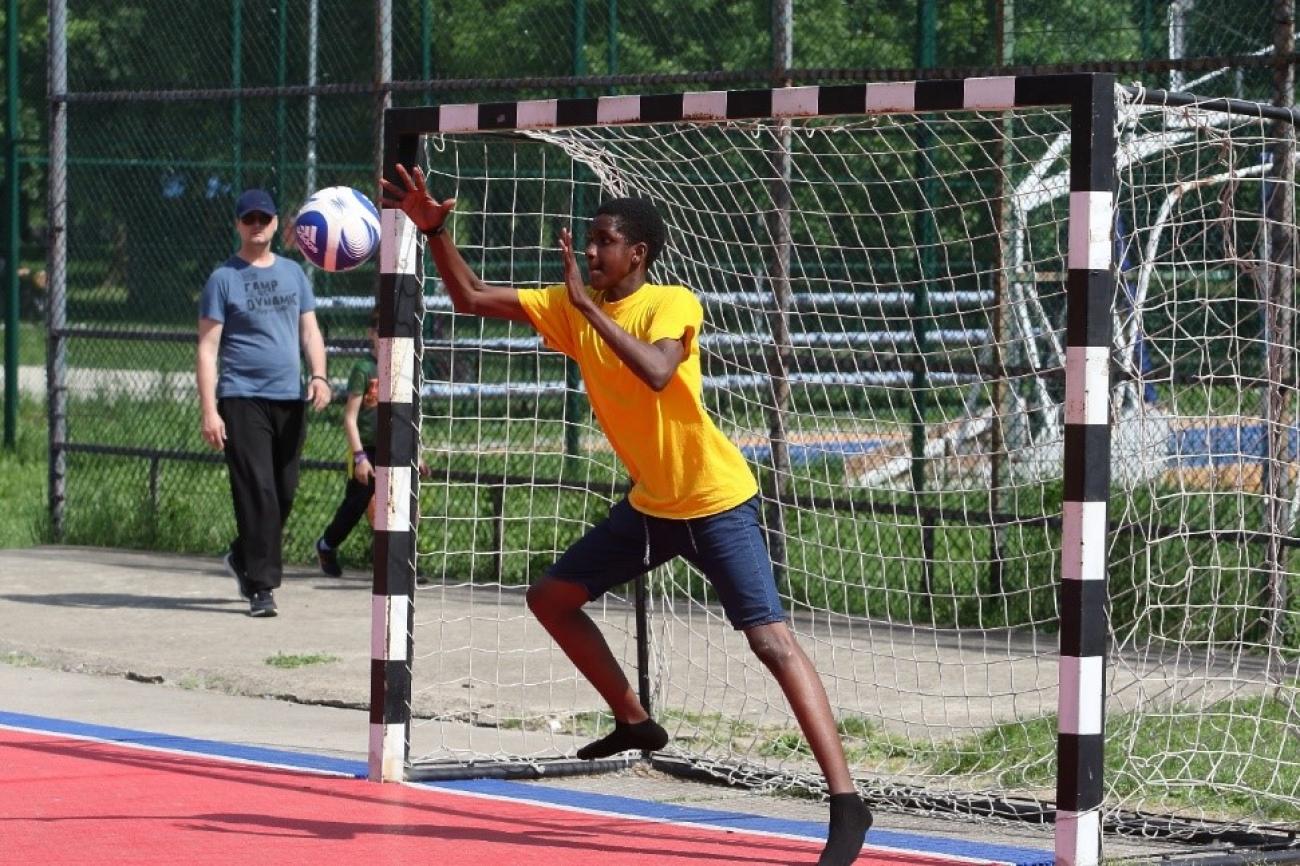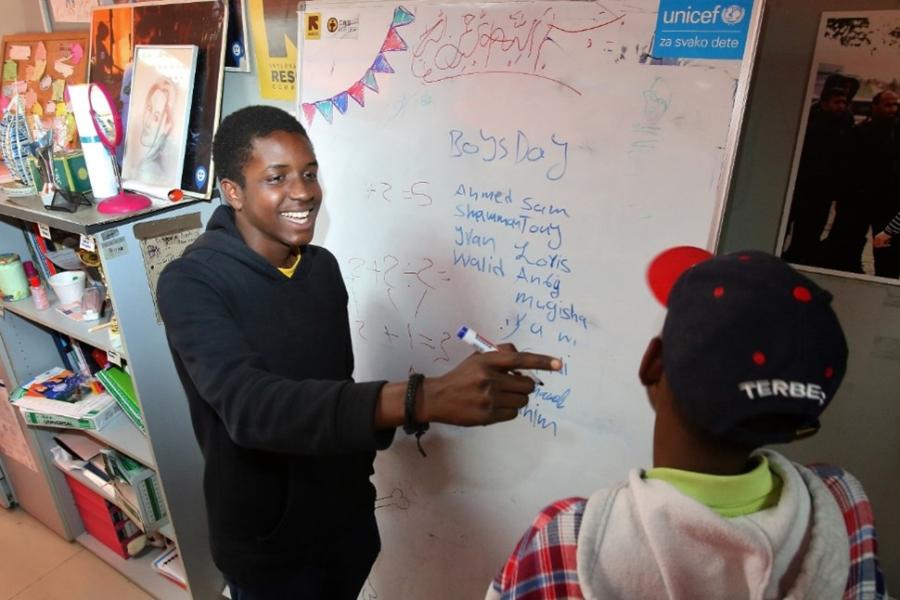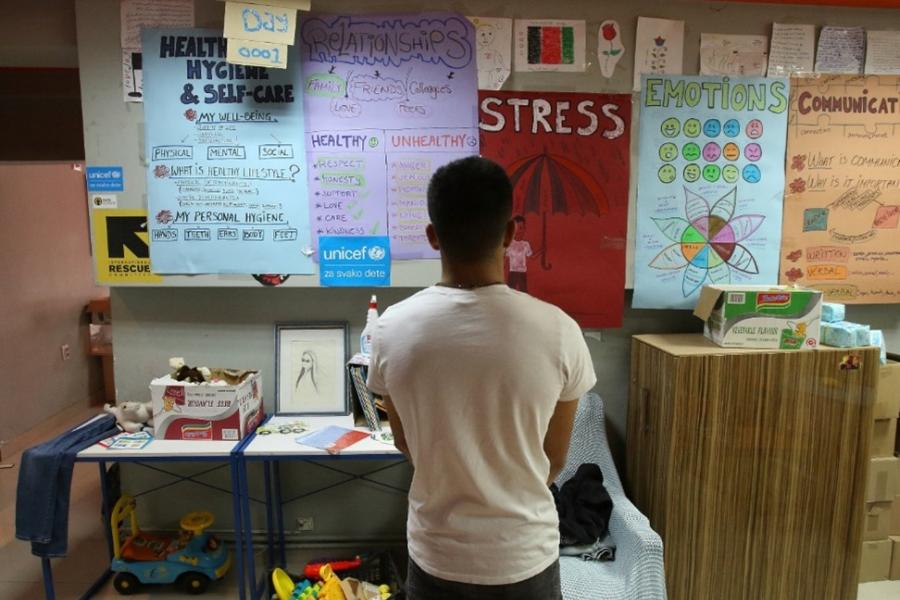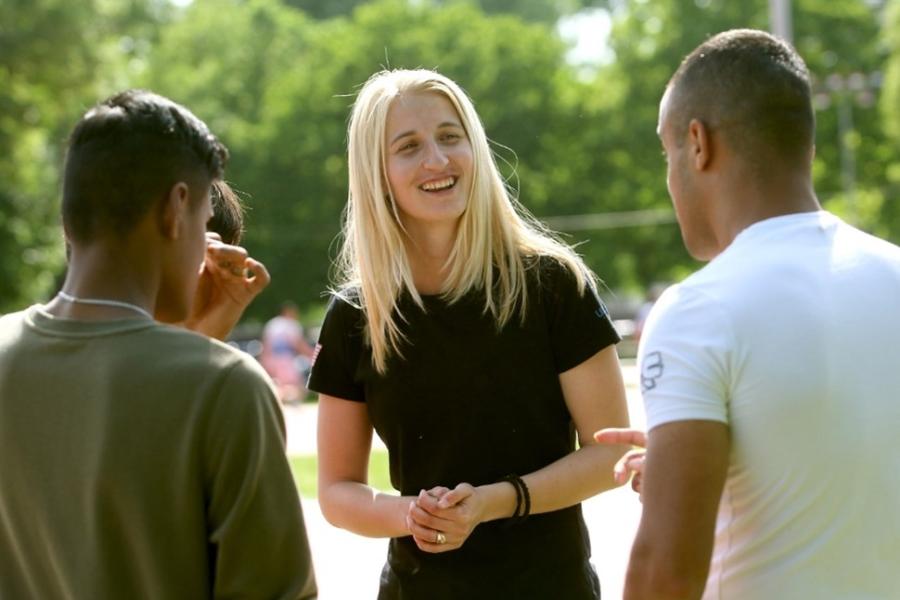From Uncertainty to Safety

8th May 2022, Belgrade
“When you’re a child, you like being with your friends, playing football and riding a bike. You can do all that at Info Park. The best thing is that here, you can feel like a child again,” says nineteen-year-old Ali[1] from Afghanistan, in perfect Serbian. He learned it in the 5 years that he has been in Serbia. During this time, he was granted asylum, enrolled in secondary school and became a cultural mediator for Pashto and Farsi at Info Park, as part of a UNICEF-supported programme, where he helps refugees and migrants.
“To every boy that we meet at the Refugee Reception Centre, or that we find alone in the park or at the border, I say – come to Info Park, come once a week to Boys’ Day. There are boys your age, you can play with them, study, socialize, talk,” says Ali who was himself that boy, alone and scared in one of Belgrade’s parks.

He understands these children. His story, just like those of many other boys who fled their countries alone or with their families, starts with the same sentence - I had to leave.
Although he remembers a happy childhood in Kabul, his friends and his school, in 2017, when he was 14 years old, he left Afghanistan. With just one friend, he took a journey that no child should ever take.
“You set off and you don't know when you’ll see your family again. It was very hard. I walked a lot. I was afraid that the police would catch me,” says Ali.
After several months of walking, of fear and uncertainty, he arrived in Serbia a couple of days before New Year’s Eve in 2018. He slept on the streets the first few nights.
“Then people from Info Park found me and helped me settle into the Reception Centre, and later in a safe house, because I was an unaccompanied child,” says Ali.
Within Info Park’s programme for refugee and migrant children, which is implemented with the support of UNICEF, one of the activities is related to the psychosocial protection of unaccompanied children. Ali first came to Info Park’s psychosocial support workshop after one year of being in Serbia. Since then, that place has been his home away from home.
“They know my entire life here. It meant a lot to me that someone heard my story. You have to talk to someone you trust to feel better. Now I encourage other boys to talk. We’re like a family here,” says Ali.
For years, he hasn’t missed a single Boys’ Day. That’s the happiest day of the week for many other boys too.
One week they go to play football, go to the movie, or bowling. Another week they participate in workshops where facilitators teach them about the prevention of gender-based and sexual violence, abuse and human trafficking.
“Topics also include emotions, communication, stress, relationships with family, friends, health. They want to talk about stress the most, because their journey is hard and they are taking care of their families,” says Ali.

And fifteen-year-old Mohammed has not missed a Boys’ Day for the three weeks he has been coming to Info Park. Last year he fled Somalia with his mother and seven siblings.
“Our childhood was hard. We didn’t go to school and we just studied the Quran. My father told us one day - if you go to Serbia or another country, you will have a better future,” says Mohammed, a boy with bright eyes and a wide smile. Because at Info Park, he says, he is always smiling. He plays sports there, meets new friends, talks about Somalia, his father, his school.
“I feel safe here. This place is good for children. If someone is sad or under pressure, they can come here to cheer up and unload their worries,” he explains.
Children are the most vulnerable migrant population, particularly if they travel alone. They often don’t stay at the centres and that’s why they are at risk of violence and violation of their rights.
That is why UNICEF Serbia, in partnership with Info Park in Belgrade, is implementing the Child Protection and Psychosocial Support Project for refugee and migrant children, including unaccompanied and separated children.
For five years now, the Info Park team has been locating, identifying and taking care of children, usually boys who travel unaccompanied or are separated from their families. They refer them to the Centres for Social Work and the Commissariat for Refugees and Migration.
In addition to organizing educational workshops and Boys’ Days, they provide children and their families with daily information about migration experiences, possibilities for legal protection and integration, access to services in the field of health, education, coping with trauma, and experiences of sexual and gender-based violence. At the height of the COVID-19 pandemic, through a Viber community and an SOS hotline, children and their parents were able to receive information on protection measures, vaccinations and assistance.
Irena Abdelmaksoud has been working for seven years at Info Park as a specialist for the protection of unaccompanied and separated children. Since 2018, she has also been involved in the programme Child protection and prevention of gender-based violence for women and children on the move. In her experience, a large number of boys are coming with existing traumas from their country of origin, but also from their journey and stay in Serbia.
“They are often unable to recognize various forms of physical or psychological violence and neglect, or are unable to make decisions that are in their best interest. One of the examples that best illustrates this is when boys initially say in interviews that they did not have any major problems along the way, but after an in-depth conversation, they reveal that they were forced to cross long and unsafe distances, that they spent days without food and water, that they witnessed scenes of violence against refugees and migrants, or that they were exposed to police brutality. This results in them having problems with sleeping, eating or concentration, and they are at times aggressive or prone to self-harming,” explains Irena.

That is why continuous work with boys, while providing a space where they can feel safe and accepted, is of crucial importance. Since the start of 2021, the Info Park team has identified and supported more than 1200 unaccompanied and separated boys from Afghanistan, Syria, Iraq, Eritrea, Pakistan, India and Bangladesh. The support has changed their lives and desires and provided opportunities for many of them.
Mohammed has also been thinking a lot about his future. He wants to be a pilot in Germany or England.
However, Ali, from the beginning of our story, wants to stay in Serbia and be a social worker or an Arabic teacher. Whatever he decides, he will certainly continue helping children who are facing hardships like he was.
Since the start of the refugee and migrant crisis, UNICEF has been working to ensure the child protection and overall wellbeing of refugee and migrant children and their parents. Workshops and info-sessions for children, recreational and creative activities, including activities for unaccompanied and separated boys, have enabled the recovery from trauma and continuation of the proper development of children and young people.
Written by Ivana Miljković
[1] The name has been changed to protect his identity.






